
Related
Guests
- Roberto Lovatowrites for New America Media and is a frequent contributor to The Nation Magazine. He blogs at ofamerica.wordpress.com.
- Amy Alexanderjournalist and author. She has written for several publications and is currently the Alfred Knobler Journalism Fellow at The Nation Institute. She is the author of 50 Black Women Who Have Changed America and is now writing a book about race and the media.
In Chicago, nearly 10,000 journalists of color are gathered for a convention that brings together members of the National Association of Black Journalists, the National Association of Hispanic Journalists, the Asian American Journalists Association and the Native American Journalists Association. It’s organized by UNITY, Journalists of Color, Inc. We host a discussion with Democracy Now! co-host and former president of NAHJ, Juan Gonzalez, and journalists Roberto Lovato and Amy Alexander. [includes rush transcript]
Transcript
AMY GOODMAN: We turn now to Chicago, where nearly 10,000 journalists of color are gathered for a convention that brings together members of the National Association of Black Journalists, the National Association of Hispanic Journalists, the Asian American Journalists Association and the Native American Journalists Association. It’s organized by UNITY.
UNITY began over twenty years ago in Philadelphia over a conversation between our very own Juan Gonzalez and Will Sutton of the National Association of Black Journalists. The first conference in ’94 in Atlanta drew over 6,000 people, the largest gathering of journalists in US history.
We now host a discussion about race, politics and the media. We’re joined by two guests at the conference: Roberto Lovato, frequent commentator on immigration and Latino politics, writes for New America Media and blogs at ofamerica.wordpress.com; and Amy Alexander, the Alfred Knobler Journalism Fellow at The Nation Institute, writing a book about race and the media.
Democracy Now! co-host Juan Gonzalez is there, as well, past president of the National Association of Hispanic Journalists. This weekend, he’s being inducted into the National Association of Hispanic Journalists Hall of Fame. It’s a gala this evening in Chicago. First, Juan, congratulations!
JUAN GONZALEZ: Thank you, Amy.
AMY GOODMAN: Well, it’s great to have you all with us. Juan, why don’t you take it away?
JUAN GONZALEZ: Yeah, well, I’d like to start — obviously, this conference, the UNITY conference, comes at a time when there is enormous upheaval in the old-stream media — in newspapers, radio and television — as they’re confronting huge changes, downsizing. Massive layoffs are occurring, and that’s been the big topic of conversation now at this convention.
I’d like to ask, starting with Amy Alexander, your sense of, at this particular juncture, the changes in the industry and how it’s going to affect the coverage of the growing population of people of color in the United States?
AMY ALEXANDER: Well, the picture, so far, is not very encouraging. I mean, in this election year, we’ve already seen the sort of — you know, the downside of a press corps that did not know how to cover Senator Obama, or Senator Clinton, for that matter. You know, there were sort of these narratives that would develop and then take hold, and, you know, it became pretty obvious that not having more people of color on these really high-intensity, high-profile beats created perhaps, you know, more turmoil in terms of the coverage and the stories that would take hold than maybe wouldn’t have been the case otherwise.
JUAN GONZALEZ: But ironically, during the primary campaign at least, you saw for the first time on channels like CNN and even Fox and MSNBC more African American, Latino and women commentators and analysts supposedly than you ever had before.
AMY ALEXANDER: Yeah, but — sure.
JUAN GONZALEZ: But at the level of the local media, which is where most people get their news, you’ve had very little change in the overall composition of the work forces.
AMY ALEXANDER: Except a lot of those individuals were campaign operatives, you know, the Democratic Party analysts and strategists who get grabbed, many of them because they’re in Washington, frankly, and they move in the same circles as the assignment editors and this sort of thing. But the reporters on the beat of either the White House or the — with the major campaigns are not — is not very diverse. That group is not at all diverse.
JUAN GONZALEZ: Roberto, in terms of the impact on, obviously, the big story in America today, the presidential campaign, I remarked at a breakfast on UNITY yesterday morning that my fear is that if Barack Obama is elected president, then on January 21st, 2009, you’ll have this huge chorus of cries going by many people in white America: “You see? Racism is over. There’s no more need for any kind of programs now, because we’ve proven America is no longer racist. We’ve elected a black president.”
ROBERTO LOVATO: Well, first of all, Juan, congratulations to you for your impacts. A lot of us have benefited from yours and the efforts of others. And it’s a great pleasure to see that you’re being honored.
As far as what I call the Obamazation — Obamaization of media in the United States, in other words, talking about — having a lot of more colorful and colored people on the camera, but without talking about race directly and talking about especially working-class black, Latino, Asian and other issues, that’s my big fear right now: with the consolidation of the industry, with the discourse of a post-racial society taking hold with an Obama candidacy, we do run the risk of very — all of the kind of — some of the racist sentiments in the United States being codified and inserted into mainstream discourse even further than it is now.
And so, I think it’s important for gatherings like UNITY, NAHJ, NABJ, all the different groups — they’re more important than ever in many ways, in terms of a reminder to ourselves and to the larger society that, you know, race is an issue in media, and it affects the quality. I mean, you can have a lot of black, Latino, Asian faces, but we need to be concerned about issues more than just about culture necessarily. We need to be concerned about, you know, what’s Obama’s relationship to empire? But we’re not asking those questions.
JUAN GONZALEZ: I think the other thing, too, that has come to the foreground more, at least in this convention, is the issue of the continued concentration of ownership in media companies and the — all of the professional organizations of journalists of color have taken stands now in recent years opposing increased media concentration. NAHJ, I think, is one of the few that’s actually on record continuing to favor net neutrality in the new developing — in the internet, in terms of where the major communications companies and telecoms want to take — eliminate net neutrality. Your sense of how — of the continuing battle over media concentration and the role in communities of color being able — because many of the civil rights organizations now are not siding or not opposing media concentration in the way that they should.
ROBERTO LOVATO: Well, I think that you touch on, I think, one of the issues of our time. But most of us don’t even know what it’s about. It’s the equivalent of, say, controlling the railroads in the industrial age. What happens with the net, the access to the net, if corporations are allowed to control access to the internet, as it’s proposed? We run the risk of, you know, massive — even more massive distinctions between rich and poor. So, you have organizations, major black, Latino and Asian organizations, not really taking a position. And this is in part because of the major corporate funding that they’re getting from Comcast and other major interests that are invested in controlling the internet. So, we really, as individuals and as communities and voters, we need to speak loudly. And this is one where Obama has actually been good on.
JUAN GONZALEZ: Amy, you raised, in a recent article, the contrast between this convention of UNITY, Journalists of Color, and again had —- has a lot of media company sponsorships, corporate sponsorships, and another conference that is occurring in Atlanta this week of bloggers, of people of color who are involved in the blogosphere.
AMY ALEXANDER: Yeah. It’s sort of uncanny, you know, that this small group in Atlanta is forming and having its first convention at the same time as UNITY is having its quadrennial. The contrasts are pretty stark, but there are similarities. They -—
JUAN GONZALEZ: And that conference is called…?
AMY ALEXANDER: It’s called “Blogging While Brown.” And the organizers of Blogging While Brown described to me, you know, their reasons for forming this group, this association, and why they felt it was important to have a meeting in one place, in one time, sharing of ideas, talking about strategies, training opportunities among bloggers of color. And those are the same reasons why black journalists and Latino journalists formed their respective organizations, you know, thirty and forty years ago.
So it just sort of was an indication to me of what you might say the ascent of the blogosphere, I think, that even though bloggers are — you know, it’s a sort of nascent — it’s very early yet, in terms of whether or not blogging sites as vehicles for providing news, as platforms for providing news, we don’t really know how that’s going to shake out, in terms of their ability to provide comprehensive coverage. And yet, already you’re seeing that among this community of bloggers, many of them feel a need to form sort of these protective organizations, because they feel —-
AMY GOODMAN: Amy, Juan and Roberto, I want to thank you very much for joining us. That brings us to the end of the broadcast. And, Juan, I just want to say congratulations again. Again, Juan Gonzalez -—
JUAN GONZALEZ: Thank you, Amy.
AMY GOODMAN: — tonight being inducted into the National Association of Hispanic Journalists Hall of Fame at the meeting of the largest meeting of journalists in this country. It’s UNITY, and it’s happening in Chicago.

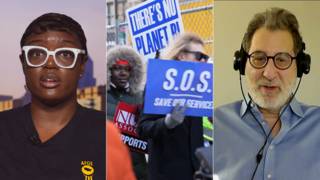

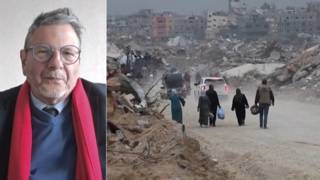





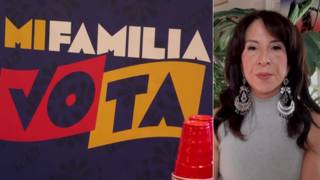
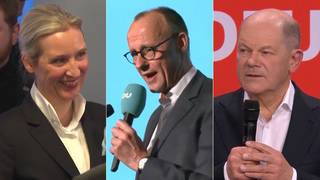
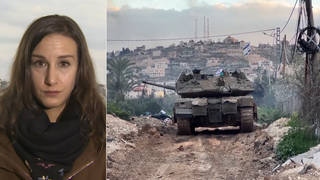
Media Options